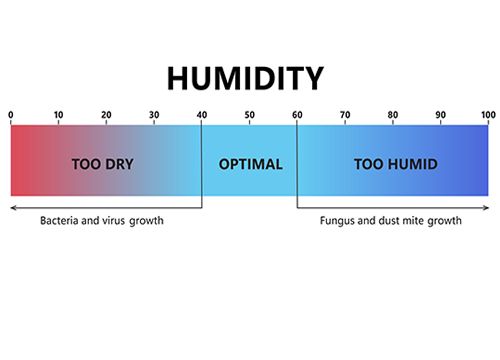HVAC and Indoor Humidity Levels: A Guide to Optimal Comfort
Maintaining the right indoor humidity level is crucial for a comfortable and healthy living environment. Your HVAC system plays a significant role in regulating indoor humidity, impacting everything from your home’s comfort to its structural integrity. Here’s a guide to understanding how HVAC systems interact with indoor humidity, and how you can optimize it for a better living experience.
The Importance of Humidity Control
Humidity is the amount of moisture in the air. Excessively high and low humidity levels can lead to a host of issues:
- High humidity: Excess moisture can promote mold growth, dust mites, and other allergens. It can also make your home feel warmer than it is, leading to increased cooling costs.
- Low humidity: When the air in your home is too dry, it can result in issues like dry skin, irritated throats, and increased static electricity. Additionally, it may contribute to the wear and tear of wooden furniture and flooring.
How HVAC Systems Manage Humidity
Most modern HVAC systems are equipped with features to manage indoor humidity:
- Air conditioning: In cooling mode, air conditioners help reduce indoor humidity by condensing moisture from the air as it passes over the evaporator coils. This process not only cools the air but also removes excess humidity.
- Dehumidifiers: These devices efficiently remove excess moisture from the air, helping to maintain a comfortable indoor environment and prevent issues like mold growth and dampness.
- Humidifiers: In colder months, or dry climates, humidifiers can be added to the HVAC system to add moisture to the air, helping to prevent dry conditions.
Optimizing Humidity Levels
To ensure your HVAC system effectively manages indoor humidity, consider these tips:
- Regular maintenance: Schedule regular maintenance for your HVAC system to verify that all components, including filters and coils, are clean and functioning correctly.
- Use a humidity monitor: Invest in a hygrometer to monitor indoor humidity levels. Ideally, indoor humidity should be kept between 30-50%.
- Adjust thermostat settings: During the cooling season, set your thermostat to a comfortable temperature. In the heating season, use a humidifier, if needed, to maintain adequate moisture levels.
- Ventilation: Ensure proper ventilation in areas prone to high humidity, such as kitchens and bathrooms. Exhaust fans can help reduce moisture buildup.
- Seal leaks: Address any leaks in your home’s insulation or windows that can lead to humidity fluctuations and affect your HVAC system’s efficiency.
Regular maintenance and mindful adjustments allow your HVAC system to operate optimally, keeping indoor humidity levels in check and contributing to a more pleasant living space. By following these tips and understanding how your HVAC system works, you can enhance your system’s efficiency and improve home comfort.
Keep humidity levels low in your home this summer by scheduling a maintenance check with Comfort Solutions HVAC today. Staying cool and comfortable is easy – simply contact us now to book your appointment!

Recent Posts

Zoned Heating Systems – What Are They? What Are the Advantages?

The Impact of Furnace Size on Efficiency and Comfort

How to Reduce Your Heating Bills this Winter

The Benefits of Seasonal HVAC Inspections
